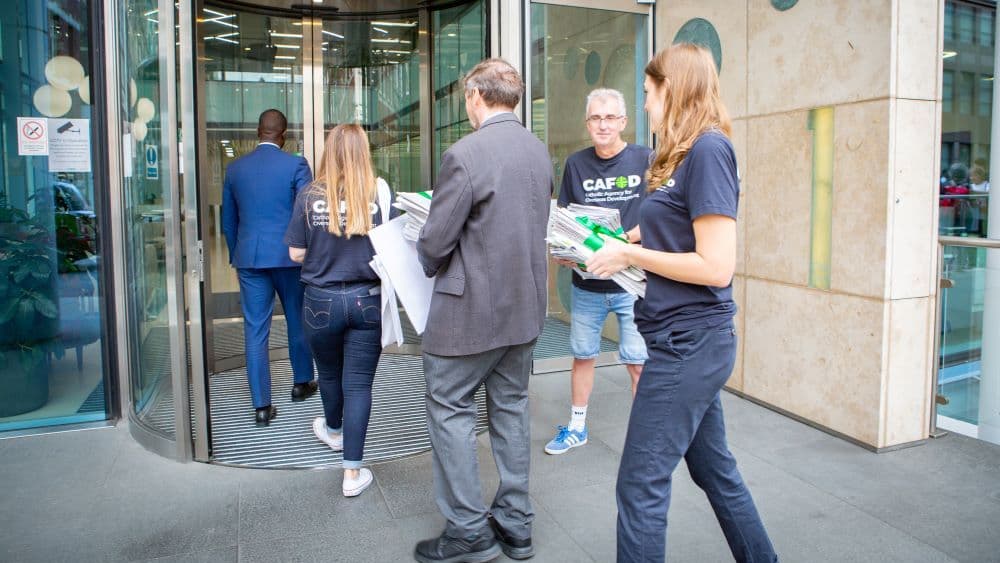LEICESTER, United Kingdom – Over 70,000 English and Welsh Catholics, including 18 bishops, are calling on the World Bank to protect the right to seeds for farmers around the globe.
The English Catholic aid group CAFOD wants the international group to allow small farmers to use their own varieties of seeds, a right that is restricted by large seed companies that dominate much of the seed market.
‘Fix the Food System,’ CAFOD’s food campaign, the group pointed out that new seed laws have been insisted on by the World Bank in exchange for financial support, yet these laws prevent farmers from sharing seeds as they have done for generations and instead force them to buy seeds from big agricultural businesses.
Andrea Speranza, CAFOD’s Campaigns Manager, said the grain variety is especially important with a changing environment.
“Seed diversity is vital in the era of climate change,” she told Crux.
“When farmers are in control of their own seeds, they can retain a wide diversity of seeds that allow them to adapt what and how they grow in response to rapidly changing conditions. But when big seed companies dominate the market, it drastically reduces the diversity of seeds on offer as they are focused on selling a small range of the most profitable crops,” she continued.
The letter sent to the World Bank – which is currently holding its annual meeting in Marrakech, Morocco – was from Salina, a farmer in Bangladesh.
In the letter, she calls for the protection of the fundamental rights of small farmers like herself to use their own varieties of seeds instead of being forced to use those provided by the dominant global seed agencies.
CAFOD’s Campaigns and Outreach Manager, Helen Moseley, said the group “would like to say a huge thank you to everyone who signed Salina’s letter.”
“Her message to the World Bank has been heard loud and clear: Unfair rules putting pressure on small farmers to buy commercial seeds aren’t acceptable. They can push farmers and the communities they feed into poverty, food insecurity and reduce their resilience to climate change,” Moseley said.
CAFOD’s food campaign is also urging the UK government to protect the right of farmers around the world to use their seeds.
“Seeds are life. They are the very foundation for farmers to produce the food that feeds us all,” the charity said.
“For generations, small-scale farmers have freely swapped and shared a wide variety of seeds to produce food and maintain biodiversity. More recently, farmers have also developed seeds that ensure crops are resilient to climate change. However, their right to choose what seeds they use is increasingly under threat as new laws are introduced across the world that limit what small farmers can do with their seeds,” CAFOD continued.
Their letter to the World Bank was supported by Bishop Tom Neylon from the Archdiocese of Liverpool.
“I support CAFOD’s Fix the Food System campaign because it’s highlighting the situation that small-scale farmers around the world are increasingly finding themselves in. Caught in a huge power imbalance with large agribusiness, even their rights to their own seeds passed down from generation to generation are being threatened,” he said.
CAFOD said small farmers like Salina are using seeds banks to let them choose what crops are most appropriate for them. The charity said her methods have allowed her to grow healthier, more sustainable food that provides for her family and goes for a higher price at her local market.
“This organic system can flourish on a far grander scale, but it needs the UK government to use its voice at the World Bank to create a more sustainable and supportive environment for farmers that trusts their knowledge and empowers them,” CAFOD said in a statement.
Speranza told Crux the issue isn’t just political, but also religious, and especially important for Catholics.
“When we come together as Catholics, we can send a clear message that food should not be treated as a mere commodity, and that the rights of farmers’ who are responsible for producing our food must be protected,” she said.
She also pointed out the role British Catholics can make by lobbying their own government to protect the international rights of small farmers.
“As a major shareholder at the World Bank, The UK government has huge influence on their policies. By raising our collective voice to our government, we can ensure the World bank supports small-scale farmers,” she said.















